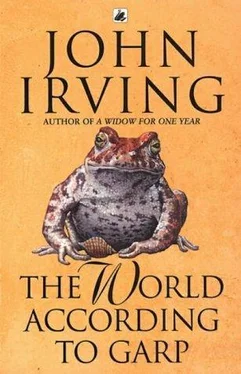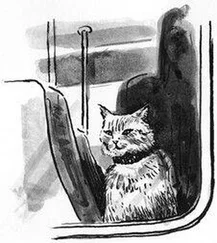“Oh boy,” Duncan groaned.
Jenny read him all of Joseph Conrad, who had been Garp's favorite writer when Garp was a boy.
It was good for Helen that she had her teaching duties to distract her from worrying about Duncan.
“That boy will straighten out,” Roberta assured her.
“He's a young man , Roberta,” Helen said. “He's not a boy anymore—although he certainly acts like one.”
“They're all boys to me,” Roberta said. “Garp was a boy. I was a boy, before I became a girl. Duncan will always be a boy, to me.”
“Oh boy,” Helen said.
“You ought to take up some sport,” Roberta told Helen. “To relax you.”
“Please, Roberta,” Helen said.
“Try running ,” Roberta said.
“ You run, I'll read,” Helen said.
Roberta ran all the time. In her late fifties she was becoming forgetful of using her estrogen, which must be used for the whole of a transsexual's life to maintain a female body shape. The lapses in her estrogen, and her stepped-up running, made Roberta's large body change shape, and change back again, before Helen's eyes.
“I sometimes don't know what's happening to you, Roberta,” Helen told her.
“It's sort of exciting,” Roberta said. “I never know what I'm going to feel like; I never know what I'm going to look like, either.”
Roberta ran in three marathon races after she was fifty, but she developed problems with bursting blood vessels and was advised, by her doctor, to run shorter distances. Twenty-six miles was too much for a former tight end in her fifties—"old Number Ninety,” Duncan occasionally teased her. Roberta was a few years older than Garp and Helen, and had always looked it. She went back to running the old six-mile route she and Garp used to take, between Steering and the sea, and Helen never knew when Roberta might suddenly arrive at the Steering house, sweaty and gasping and wanting to use the shower. Roberta kept a large robe and several changes of clothes at Helen's house for these occasions, when Helen would look up from her book and see Roberta Muldoon in her running costume—her stopwatch held like her heart in her big pass-catching hands.
Roberta, died that spring Duncan was hospitalized in Vermont. She had been doing wind sprints on the beach at Dog's Head Harbor, but she'd stopped running and had come up on the porch, complaining of “popping sounds” in the back of her head—or possibly in her temples; she couldn't exactly locate them, she said. She sat on the porch hammock and looked at the ocean and let Ellen James go get her a glass of ice tea. Ellen sent a note out to Roberta with one of the Fields Foundation fellows.
Lemon?
“No, just sugar!” Roberta called.
When Ellen brought the ice tea, Roberta downed the whole glass in a few gulps.
“That's perfect, Ellen,” Roberta said. Ellen went to fix Roberta another glass. “Perfect,” Roberta repeated. “Give me another one just like that one!” Roberta called. “I want a whole life just like that one!”
When Ellen came back with the ice tea, Roberta Muldoon was dead in the hammock. Something had popped, something had burst.
If Roberta's death struck Helen and made her feel low, Helen had Duncan to worry about—for once, a grateful distraction. Ellen James, whom Roberta had supported so much, was spared an overdose of grief by her sudden responsibilities—she was busy taking over Roberta's job at the Fields Foundation; she had big shoes to fill, as they say. In fact, size 12. Young Jenny Garp had never been as close to Roberta as Duncan had been; it was Duncan, still in traction, who took it the hardest. Jenny stayed with him and gave him one pep talk after another, but Duncan could remember Roberta and all the times she had bailed out the Garps before—Duncan especially.
He cried and cried. He cried so much, they had to change a cast on his chest.
His transsexual tenant sent him a telegram from New York.
I'LL GET OUT NOW. NOW THAT R. IS GONE. IF YOU DON'T FEEL COMFORTABLE ABOUT MY BEING HERE. I'LL GO. I WONDER. COULD I HAVE THAT PICTURE OF HER. THE ONE OF R. AND YOU. I ASSUME THAT'S YOU. WITH THE FOOTBALL. YOU'RE IN THE JERSEY WITH THE 90 THAT'S TOO BIG FOR YOU.
Duncan had never answered her cards, her reports on the welfare of his plants and the exact location of his paintings. It was in the spirit of old No. 90 that he answered her now, whoever she was—this poor confused boy-girl whom Roberta, Duncan knew, would have been kind to.
Please stay as long as you want to [he wrote to her]. But I like that photograph, too. When I get back on my feet, I'll make a copy just for you.
Roberta had told him to pull his life together and Duncan regretted he would not be able to show her that he could. He felt a responsibility now, and wondered at his father, being a writer when he was so young—having children, having Duncan, when he was so young. Duncan made lots of resolutions in the hospital in Vermont; he would keep most of them, too.
He wrote Ellen James, who was still too upset at his accident to come see him all plastered and full of pins.
Time we both got to work, though I have some catching up to do—to catch up to you. With 90 gone, we're a smaller family. Let's work at not losing anybody else.
He would have written to his mother that he intended to make her proud of him, but he would have felt silly saying it and he knew how tough his mother was—how little she ever needed pep talks. It was to young Jenny that Duncan turned his new enthusiasm.
“Goddamnit, we've got to have energy,” Duncan told his sister, who had plenty of energy. “That's what you missed—by not knowing the old man. Energy! You've got to get it on your own.”
“ I've got energy,” Jenny said. “Jesus, what do you think I've been doing—just taking care of you? ”
It was a Sunday afternoon; Duncan and Jenny always watched the pro football on Duncan's hospital TV. It was a further good omen, Duncan thought, that the Vermont station carried the game, that Sunday, from Philadelphia. The Eagles were about to get creamed by the Cowboys. The game, however, didn't matter; it was the before-the-game ceremony that Duncan appreciated. The flag was at half-mast for the former tight end Robert Muldoon. The scoreboard flashed 90! 90! 90! Duncan noted how the times had changed; for example, there were feminist funerals everywhere now; he had just read about a big one in Nebraska. And in Philadelphia the sports announcer managed to say, without snickering, that the flag flew at half-mast for Roberta Muldoon.
“ She was a fine athlete,” the announcer mumbled. “A great pair of hands.”
“An extraordinary person,” agreed the co-announcer. The first man spoke again. “Yeah,” he said, “she didda lot for...” and he struggled, while Duncan waited to hear for whom —for freaks, for weirdos, for sexual disasters, for his father and his mother and himself and Ellen James. “She didda lot for people wid complicated lives,” the sports announcer said, surprising himself and Duncan Garp—but with dignity.
The band played. The Dallas Cowboys kicked off to the Philadelphia Eagles; it would be the first of many kickoffs that the Eagles would receive. And Duncan Garp could imagine his father, appreciating the announcer's struggle to be tactful and kind. Duncan actually imagined Garp whooping it up with Roberta; somehow, Duncan felt that Roberta would be there—privy to her own eulogy. She and Garp would be hilarious at the awkwardness of the news.
Garp would mimic the announcer: “She didda lot for refashioning da vagina!”
“Ha!” Roberta would roar.
Читать дальше












